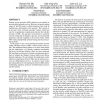Free Online Productivity Tools
i2Speak
i2Symbol
i2OCR
iTex2Img
iWeb2Print
iWeb2Shot
i2Type
iPdf2Split
iPdf2Merge
i2Bopomofo
i2Arabic
i2Style
i2Image
i2PDF
iLatex2Rtf
Sci2ools
CONEXT
2008
ACM
2008
ACM
On cooperative settlement between content, transit and eyeball internet service providers
Internet service providers (ISPs) depend on one another to provide global network services. However, the profit-seeking nature of the ISPs leads to selfish behaviors that result in inefficiencies and disputes in the network. This concern is at the heart of the "network neutrality" debate, which also asks for an appropriate compensation structure that satisfies all types of ISPs. Our previous work showed in a general network model that the Shapley value has several desirable properties, and that if applied as the revenue model, selfish ISPs would yield globally optimal routing and interconnecting decisions. In this paper, we use a more detailed and realistic network model with three classes of ISPs: content, transit, and eyeball. This additional detail enables us to delve much deeper into the implications of a Shapley settlement mechanism. We derive closed-form Shapley values for more structured ISP topologies and develop a dynamic programming procedure to compute the Shapley...
| Added | 18 Oct 2010 |
| Updated | 18 Oct 2010 |
| Type | Conference |
| Year | 2008 |
| Where | CONEXT |
| Authors | Richard T. B. Ma, Dah-Ming Chiu, John C. S. Lui, Vishal Misra, Dan Rubenstein |
Comments (0)

